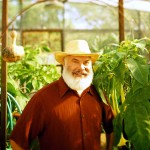Living in one of Florida’s wealthiest counties, people in Sarasota tend to link hunger with the homeless people they see on the streets.
But store clerks, cleaning people, night-shift workers and others from many walks of life go without food.

Sarasota Memorial Hospital interns Danielle Dimengo, left, and Dan Washmuth volunteer to pass out frozen peaches and fresh onions at the All Faiths Food Bank Mobile Cupboard at Shenandoah Park in Sarasota on Thursday, Feb. 7, 2013. Along with non-perishable goods, All Faiths Food Bank distributes fresh and frozen produce and frozen meat. STAFF PHOTO / MIKE LANG
“It’s the people who are working one, two, three low-paying jobs who sometimes go to bed hungry,” says Sandra Frank, executive director of All Faiths Food Bank. “People here just do not think of Sarasota as a place where tens of thousands of people don’t know where their next meal will come from.”
The numbers of hungry people — and how best to find and help them — will be the focus of a new partnership between the food bank and the Gulf Coast Community Foundation, one of the area’s top philanthropic organizations.
“We look at the community to see what the most pressing issues are,” says Jon Thaxton, Gulf Coast’s director of community investment. “The hunger issue just stood out to us.”
All Faiths, which distributes 5 million meals each year to 190 local agencies and programs, knows of about 62,000 hungry people in Sarasota.
The initiative, called Feeding Hungry Families, seeks to quantify the problem with three research components.
First is a mapping project, which will inventory hunger-relief programs, resources and services in Sarasota and DeSoto counties. DeSoto, just east of Sarasota County, is the poorest county in Florida, according to a 2012 U.S. Census report.
Gaps in service, specific needs in certain areas and the best locations for food distribution will be determined. Researchers will count the number of people who receive food stamps, list local retailers who provide food and find churches and agencies that operate food pantries, soup kitchens and Meals on Wheels routes.
The mapping project will be finished in April.
The second part of the initiative is providing data to Hunger in America, a study conducted every four years by the non-profit Feeding America organization. It is the largest study of charitable food distribution in the country.
Agency surveys will be followed by client surveys to gather information on health, coping strategies, nutrition choices and vulnerability.
Preliminary findings are expected late this year.
Finally, the local initiative will study child hunger, identifying the neighborhoods with the highest number of under-served children. This will involve one-to-one interviews with children between ages 7 and 17.
The child study is expected by September.
Data on the number of hungry children are lacking. One indicator is the percentage of children on free or reduced-price lunches at area schools. In Sarasota, that number is near 50 percent. In DeSoto County, it’s 84 percent.
“If you asked people to guess the number in Sarasota, you’d probably get 5 or 6 percent,” says Thaxton.
He says this is a unique initiative because it involves a well-established community food bank and an organization with the funding to accomplish the goals.
“We won’t be waiting until we’re done to start acting on what we find,” Thaxton says.
He says the foundation’s directors hope the initiative will be a template for other communities.
The two organizations have asked Andrew Weil, physician and author, to kick off the initiative with an already sold-out luncheon on Monday.
Weil, a proponent of healthy meals with an abundance of fresh fruits and vegetables, will speak on “What We Eat Matters.” He says he is concerned about low-income areas with a dearth of options for healthy eating.
The local initiative not only seeks to increase the amount of food available to those who need it, but the quality, as well.
Although food banks traditionally stock up on canned goods and other non-perishables, Frank says All Faiths has been working for two years to include fresh produce in its offerings.
“This has been a seismic change,” she says. “We increased the amount of produce by 50 percent in 2012. We want to be not just a food bank, but a nutrition bank.”
The produce comes from retail supermarkets, civic groups who glean local fields, and sometimes people with trees that make more fruit than they can eat.
“So many mornings I get here and see a bucket of grapefruit or oranges at the door.”




